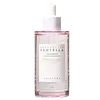What's inside
What's inside
 Key Ingredients
Key Ingredients

 Benefits
Benefits

 Concerns
Concerns

 Ingredients Side-by-side
Ingredients Side-by-side

Water
Skin ConditioningAzelaic Acid
BufferingPropylene Glycol
HumectantSodium Hydroxide
BufferingPentylene Glycol
Skin ConditioningPanthenol
Skin ConditioningSorbitol
HumectantChondrus Crispus Extract
Skin ConditioningHydroxyethylcellulose
Emulsion StabilisingChlorella Vulgaris Extract
Skin ConditioningGlucose
HumectantSaccharum Officinarum Extract
Moisturising1,2-Hexanediol
Skin ConditioningButylene Glycol
HumectantFructooligosaccharides
HumectantFructose
HumectantEthylhexylglycerin
Skin ConditioningBiosaccharide Gum-1
HumectantTromethamine
BufferingXanthan Gum
EmulsifyingTocopherol
AntioxidantBetaine
HumectantZinc PCA
HumectantDipropylene Glycol
HumectantHyaluronic Acid/Polyisopropylacrylamide Copolymer
HumectantCaprylyl/Capryl Glucoside
CleansingHydrogenated Lecithin
EmulsifyingCeramide NP
Skin ConditioningWater, Azelaic Acid, Propylene Glycol, Sodium Hydroxide, Pentylene Glycol, Panthenol, Sorbitol, Chondrus Crispus Extract, Hydroxyethylcellulose, Chlorella Vulgaris Extract, Glucose, Saccharum Officinarum Extract, 1,2-Hexanediol, Butylene Glycol, Fructooligosaccharides, Fructose, Ethylhexylglycerin, Biosaccharide Gum-1, Tromethamine, Xanthan Gum, Tocopherol, Betaine, Zinc PCA, Dipropylene Glycol, Hyaluronic Acid/Polyisopropylacrylamide Copolymer, Caprylyl/Capryl Glucoside, Hydrogenated Lecithin, Ceramide NP
Centella Asiatica Extract 50.47%
CleansingWater
Skin ConditioningButylene Glycol
HumectantPropanediol
Solvent1,2-Hexanediol
Skin ConditioningAloe Barbadensis Leaf Extract
EmollientGlycereth-26
HumectantHydroxyacetophenone
AntioxidantGlycerin
HumectantCarbomer
Emulsion StabilisingTromethamine
BufferingPanthenol
Skin ConditioningEthylhexylglycerin
Skin ConditioningDisodium EDTA
Dipotassium Glycyrrhizate
HumectantAmmonium Polyacryloyldimethyl Taurate
Emulsion StabilisingBiosaccharide Gum-1
HumectantHyaluronic Acid
HumectantHydrolyzed Hyaluronic Acid
HumectantSodium Hyaluronate
HumectantHydroxyethylcellulose
Emulsion StabilisingChamomilla Recutita Flower Extract
MaskingMineral Salts
Skin ConditioningTripeptide-3
Skin ConditioningAcetyl Hexapeptide-8
HumectantAcetyl Octapeptide-3
HumectantCopper Tripeptide-1
Skin ConditioningPalmitoyl Pentapeptide-4
Skin ConditioningPalmitoyl Tetrapeptide-7
Skin ConditioningPalmitoyl Tripeptide-1
Skin ConditioningTripeptide-1
Skin ConditioningTripeptide-2
Skin ConditioningCentella Asiatica Extract 50.47%, Water, Butylene Glycol, Propanediol, 1,2-Hexanediol, Aloe Barbadensis Leaf Extract, Glycereth-26, Hydroxyacetophenone, Glycerin, Carbomer, Tromethamine, Panthenol, Ethylhexylglycerin, Disodium EDTA, Dipotassium Glycyrrhizate, Ammonium Polyacryloyldimethyl Taurate, Biosaccharide Gum-1, Hyaluronic Acid, Hydrolyzed Hyaluronic Acid, Sodium Hyaluronate, Hydroxyethylcellulose, Chamomilla Recutita Flower Extract, Mineral Salts, Tripeptide-3, Acetyl Hexapeptide-8, Acetyl Octapeptide-3, Copper Tripeptide-1, Palmitoyl Pentapeptide-4, Palmitoyl Tetrapeptide-7, Palmitoyl Tripeptide-1, Tripeptide-1, Tripeptide-2
 Reviews
Reviews

Ingredients Explained
These ingredients are found in both products.
Ingredients higher up in an ingredient list are typically present in a larger amount.
1,2-Hexanediol is a synthetic liquid and another multi-functional powerhouse.
It is a:
- Humectant, drawing moisture into the skin
- Emollient, helping to soften skin
- Solvent, dispersing and stabilizing formulas
- Preservative booster, enhancing the antimicrobial activity of other preservatives
Biosaccharide Gum-1 is a sugar created by fermenting sorbitol (which usually comes from potato starch!). It is known for its soothing and moisturizing properties.
Manufacturer tests show this ingredient helped reduce irritation from lactic acid by almost half and kept skin hydrated long-term as a humectant
Beyond hydration, Biosaccharide Gum-1 gives formulas a silky, non-sticky feel.
This ingredient is gentle, versatile, and suitable for all skin types.
Fun fact: Similar sugars can be found naturally in fruits like apples and pears.
Learn more about Biosaccharide Gum-1Butylene Glycol (or BG) is used within cosmetic products for a few different reasons:
Overall, Butylene Glycol is a safe and well-rounded ingredient that works well with other ingredients.
Though this ingredient works well with most skin types, some people with sensitive skin may experience a reaction such as allergic rashes, closed comedones, or itchiness.
Learn more about Butylene GlycolEthylhexylglycerin (we can't pronounce this either) is commonly used as a preservative and skin softener. It is derived from glyceryl.
You might see Ethylhexylglycerin often paired with other preservatives such as phenoxyethanol. Ethylhexylglycerin has been found to increase the effectiveness of these other preservatives.
Hydroxyethylcellulose is used to improve the texture of products. It is created from a chemical reaction involving ethylene oxide and alkali-cellulose. Cellulose is a sugar found in plant cell walls and help give plants structure.
This ingredient helps stabilize products by preventing ingredients from separating. It can also help thicken the texture of a product.
This ingredient can also be found in pill medicines to help our bodies digest other ingredients.
Learn more about HydroxyethylcellulosePanthenol is a common ingredient that helps hydrate and soothe the skin. It is found naturally in our skin and hair.
There are two forms of panthenol: D and L.
D-panthenol is also known as dexpanthenol. Most cosmetics use dexpanthenol or a mixture of D and L-panthenol.
Panthenol is famous due to its ability to go deeper into the skin's layers. Using this ingredient has numerous pros (and no cons):
Like hyaluronic acid, panthenol is a humectant. Humectants are able to bind and hold large amounts of water to keep skin hydrated.
This ingredient works well for wound healing. It works by increasing tissue in the wound and helps close open wounds.
Once oxidized, panthenol converts to pantothenic acid. Panthothenic acid is found in all living cells.
This ingredient is also referred to as pro-vitamin B5.
Learn more about PanthenolTromethamine helps balance the pH and improve the texture of a product. It is synthetically created.
As an emulsifier, Tromethamine prevents oil and water ingredients from separating. This helps stabilize the product and elongate a product's shelf life. Tromethamine also makes a product thicker.
Tromethamine helps balance the pH level of a product. Normal pH level of skin is slightly acidic (~4.75-5.5). The acidity of our skin is maintained by our glands and skin biome. Being slightly acidic allows our skin to create an "acid mantle". This acid mantle is a thin barrier that protects our skin from bacteria and contaminants.
Oral Tromethanmine is an anti-inflammatory drug but plays the role of masking, adding fragrance, and/or balancing pH in skincare.
1,3-Propanediol, 2-amino-2-(hydroxymethyl)-
Learn more about TromethamineWater. It's the most common cosmetic ingredient of all. You'll usually see it at the top of ingredient lists, meaning that it makes up the largest part of the product.
So why is it so popular? Water most often acts as a solvent - this means that it helps dissolve other ingredients into the formulation.
You'll also recognize water as that liquid we all need to stay alive. If you see this, drink a glass of water. Stay hydrated!
Learn more about Water